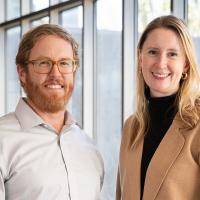6 min read
Georgia Tech students designed a driving simulation to investigate how intentional robot deception affects trust.
6 min read
The team bioengineered a synthetic tumor model to understand and then demonstrate how the tumor microenvironment impacts the effectiveness of targeted therapies for a specific type of lymphoma.
6 min read
Mike Farrell, I. King Jordan, Phil Santangelo, and Mark Styczynski working on $14.7 million DARPA funded project to developing novel diagnostic devices able to rapidly identify the bacteria causing sepsis.
5 min read
Researchers study gamma-ray bursts and their neutrino emissions.
2 min read
Electric vehicles are becoming increasingly popular, and with economic and environmental impacts colliding, Georgia Tech experts are leading the way in the development of next-generation solutions.
4 min read
4 min read
Wendy White manages the food and beverage program at the Georgia Manufacturing Extension Partnership.
2 min read
5 min read
https://mediaspace.gatech.edu/media/GT+Atlanta+Science+Festival+Video+Recap/1_lmgjrbkoMore than 1,500 parents and children across the Atlanta metropolitan area attended a jam-packed second annual Georgia Tech Science and Engineering Day held on Saturday, March 1.















